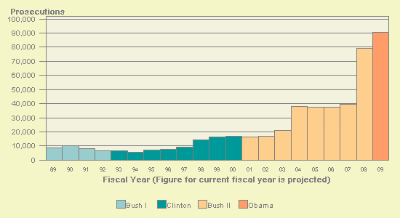The down payment's been paid, when will the goods to be delivered?
For years, all we've heard from those opposed to immigration and immigration reform is that until the government could prove that it was "serious" about border security and enforcement, no meaningful discussion of immigration reform was going to take place. The mantra of "we can't reform immigration laws until we control immigration, and we can't control immigration unless we control our borders" has been the guiding principle behind every obstructionist attempt to derail systematic reform. And attempts to appease restrictionists, by adopting "enforcement first" policies" have become the accepted framework from which all discussions were forced to start.
But most of those working for positive change have known all along that "enforcement first" is just a catch-22. It's an ever-moving target that was never intended to be reached. The ultimate goal of those opposed to reform has never been to "control" immigration...but rather to end it.
Yet despite these obvious facts, both the Bush and Obama administrations dived head first into the enforcement waters.
The last few years have been marked by hugely escalating enforcement budgets, increased apprehension, deportation and detention, increased use of local law enforcement, raids, and employer audits.
Programs like "Operation Streamline", "Secure Communities", "287G", "Operation Community Shield", and "Rapid REPEAT", (to name a few) have all been ramped up to locate, and remove the undocumented population. And while the human suffering caused by these and other programs has been immeasurable, no one can deny their effect on both illegal entry and presence.
So the question now becomes; At what point can we say enough is enough?
At what point will the forces that demand strict enforcement before any discussion of reform can begin, be content? Immigrant communities across this nation have paid the price, they've made their down payment on reform ...when do they finally see something in return?
A couple of new studies demonstrate just how effective and massive these programs and operations have become. Both examining just one aspect of enforcement ...federal prosecutions for immigration related crimes ... which have increased 459% in the last ten years.
The Transactional Records Access Clearinghouse (TRAC) and Warren Institute at the University of California at Berkeley recently released reports highlighting the dramatic increase in federal immigration prosecutions and the link to Operation Streamline, a DHS program which mandates federal criminal prosecution of all persons caught crossing the border unlawfully.
The Warren Institute report highlights the impact of Operation Streamline on immigration enforcement and the TRAC report shows that federal immigration prosecutions rose to record levels during fiscal year 2009 and how a shift in priorities has created the largest number of federal immigration prosecutions of non-violent border crossers ever. The latest available data from the Justice Department show that during the first nine months of FY 2009 the government reported 67,994 new immigration prosecutions. If this activity continues at the same pace, the annual total of prosecutions will be 90,659 for this fiscal year. According to the case-by-case information analyzed by the Transactional Records Access Clearinghouse (TRAC), this estimate is up 14.1 percent over the past fiscal year when the number of prosecutions totaled 79,431.
Number Year-to-date 67,994 Percent Change from previous year 14.1 Percent Change from 5 years ago 139 Percent Change from 10 years ago 459 Percent Change from 20 years ago 973
The comparisons of the number of defendants charged with immigration-related offenses are based on case-by-case information obtained by TRAC under the Freedom of Information Act from the Executive Office for United States Attorneys
Compared to five years ago when there were 37,884, the estimate of FY 2009 prosecutions of this type is up 139 percent. Prosecutions over the past year are much higher than they were ten years ago. Overall, the data show that prosecutions of this type are up 459 percent from the level of 16,219 reported in 1999 and up 973 percent from the level of 8,448 reported in 1989.
TRAC
While the TRAK report looked at record increase in all federal immigration prosecutions, the Warren Institute looked at the effect of just one Operation along the US/ Mexico border: Operation Streamline.The Department of Homeland Security(DHS) began implementing OperationStreamline along the U.S.-Mexico border in2005. The program has fundamentally transformed DHS’s border enforcement practices. Before Operation Streamline began, DHSBorder Patrol agents voluntarily returned first-time border crossers to their home countries or detained them and formally removed them from the United States through the civil immigration system. The U.S. Attorney’s Office reserved criminal prosecution for migrants with criminal records and for those who made repeated attempts to cross the border. Operation Streamline removed that prosecutorial discretion, requiring the criminal prosecution of all undocumented border crossers, regardless of their history.
Operation Streamline has generated unprecedented caseloads in eight of the eleven federal district courts along the border, straining the resources of judges, U.S. attorneys, defense attorneys, U.S. Marshals, and court personnel. The program’s voluminous prosecutions have forced many courts to cut procedural corners. Magistrate judges conduct en masse hearings, during which as many as 80 defendants plead guilty at a time, depriving migrants of due process. Indeed, in December 2009, the U.S. Court of Appeals for the Ninth Circuit held that Operation Streamline’s en masse plea hearings in Tucson, Arizona violate federal law.By focusing court and law enforcement resources on the prosecution of first-time entrants, Operation Streamline also diverts attention away from fighting drug smuggling, human trafficking, and other crimes that create border violence
Assembly-Line Justice: A Review of Operation Streamline
If we add the fact that President Obama's proposed budget for 2011 includes additional increases in spending along the border and for interior enforcement it becomes obvious that the enforcement juggernaut has far from reached it's end.
So we must now ask ourselves ... when in fact will the border ever be "secure" enough?
We have long heard about the failures of 1986 and how if only the laws were enforced, then we could start to look at reforming the dysfunctional and broken system that only feeds the growing prison-industrial complex.
Well, the laws have been enforced.
There's been a nearly 1000% increase in immigration prosecutions since 1990. In 2009 alone, the U.S. government had held over 440,000 people in immigration custody – more than triple the number of people in detention just ten years ago - and deported 387,000 immigrant workers, the highest recorded number in U.S. history.
So, how much longer are the "sins" of 1986 to hang over everyone's heads? Is there some secret magic number that needs to be reached? Is it a 2000% or 3000% increase in prosecutions? One Million in detention or deported?
How large a price must be paid by immigrant communities before there is a remedy? How many more mothers must be separated from their children? How many families torn apart? Communities terrorized? How many more lives destroyed and futures taken away?
When will the down payment paid in suffering and sorrow be acknowledge ... and the promise of reform finally be honored.?
I think it's fair to say ...NOW!!!!!!















 These have been heady times for those in the migrant-rights movement.
These have been heady times for those in the migrant-rights movement.  Last week when speaking on the immigration, Rep. Rahm Emanuel (Ill.), chairman of the House Democratic Caucus,
Last week when speaking on the immigration, Rep. Rahm Emanuel (Ill.), chairman of the House Democratic Caucus,  An anonymous poster left a comment in one of my recent posts on immigration reform meta issues that has left me grappling for an answer. He/she raised a point that in some ways goes to the heart of the pro-immigrant movement's current inability to break the apparent right-wing stranglehold on the "immigration debate."
An anonymous poster left a comment in one of my recent posts on immigration reform meta issues that has left me grappling for an answer. He/she raised a point that in some ways goes to the heart of the pro-immigrant movement's current inability to break the apparent right-wing stranglehold on the "immigration debate."  One would think that a bill that would allow 60,000 high school graduates a year the opportunity to pursue higher education could garner pretty widespread support in Washington, particularly given our President's commitment to educational excellence and leaving no child behind.
One would think that a bill that would allow 60,000 high school graduates a year the opportunity to pursue higher education could garner pretty widespread support in Washington, particularly given our President's commitment to educational excellence and leaving no child behind. I believe the last round of negotiations on Comprehensive Immigration Reform (CIR), the so-called "Grand Compromise", provided a huge wake-up call for the immigrant-rights community. We found out just how badly the right-wing had out flanked us both in Washington and in the media and that any hope for meaningful CIR was now in the distant future.
I believe the last round of negotiations on Comprehensive Immigration Reform (CIR), the so-called "Grand Compromise", provided a huge wake-up call for the immigrant-rights community. We found out just how badly the right-wing had out flanked us both in Washington and in the media and that any hope for meaningful CIR was now in the distant future. This October will mark the second anniversary of the publication of
This October will mark the second anniversary of the publication of  Twenty-one years ago, at the height of his political power, Ronald Reagan moved through Congress the Immigration Reform and Control Act of 1986. It granted amnesty to the roughly 3mil undocumented immigrants and promised increased border security and stricter enforcement of employer sanctions. We now know that that law was not only highly flawed, but set the stage for today's current immigration debate.
Twenty-one years ago, at the height of his political power, Ronald Reagan moved through Congress the Immigration Reform and Control Act of 1986. It granted amnesty to the roughly 3mil undocumented immigrants and promised increased border security and stricter enforcement of employer sanctions. We now know that that law was not only highly flawed, but set the stage for today's current immigration debate.  The Senate spent most of today's afternoon session on little more than a series of long-winded speeches in attempts to set the stage for this weeks upcoming immigration fight.
The Senate spent most of today's afternoon session on little more than a series of long-winded speeches in attempts to set the stage for this weeks upcoming immigration fight. 
















